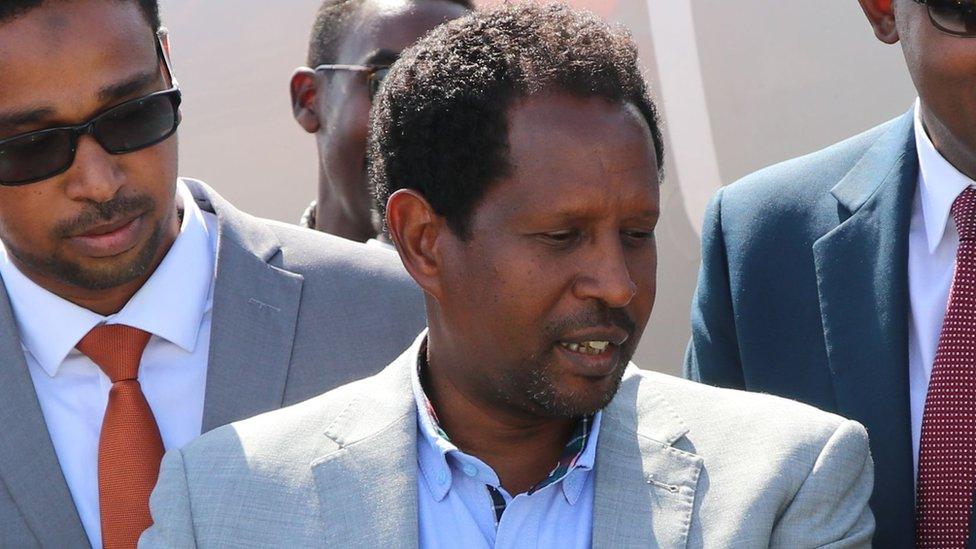Abdirahman Omar Osman, Mogadishu mayor, dies after suicide bombing
- Published

Mayor of Mogadishu Abdirahman Omar Osman died from his injuries in Doha
The mayor of Somalia's capital Mogadishu has died a week after being wounded in a suicide attack that killed at least six other people.
The female bomber blew herself up inside the office of Mayor Abdirahman Omar Osman during a security meeting.
Mr Osman, who fled to the UK during the civil war in the 1990s, became a councillor in London before returning in 2008 to help rebuild Somalia.
Militant Islamist group al-Shabab said it carried out the attack.
The mayor died in Doha, Qatar, where he was receiving treatment.
Al-Shabab's apparent target was the new UN special envoy to Somalia, James Swan, a US citizen. He had already left the building after meeting the mayor on 24 July.
It is unclear how the bomber managed to enter the heavily guarded offices.
Other victims included high-ranking local officials.
Who was the mayor?
Mr Osman fled Somalia in the early 1990s as a refugee, before achieving a postgraduate degree and UK citizenship. He also worked as a housing manager in the London borough of Ealing.
He returned to Somalia in 2008, where he served as information minister before becoming mayor of Mogadishu last year.
In a tweet, and tireless advocate for the people of Mogadishu and all Somalis".
Al-Shabab seeks to overthrow Somalia's central government and has been carrying out regular attacks in Mogadishu, despite the heavy presence of African Union peacekeepers and US-trained Somali troops.
The group is affiliated with al-Qaeda and remains a powerful presence in rural Somalia.
Few politicians did more, risked more
Andrew Harding, “óĻó“«Ć½ Africa correspondent
In a dangerous city of bitter factions, he always stood out, a gentle, decent man - focused on the business of getting things done.
His nickname was Engineer Yarisow - the small engineer - a reference to his height, his qualifications, and his practical nature.
Like many Somalis, he'd fled abroad during the civil war and spent decades in London. Engineer Yarisow became a British citizen, a Labour councillor and a pillar of the community.
But he left it all behind to return to Mogadishu a decade ago. It was a brave move and, as he knew, a risky one.
Since then, thousands of members of the diaspora have gone back to Somalia to help rebuild it, in defiance of the Islamist militants of al-Shabab.
I met Engineer Yarisow many times in Mogadishu - where he was first a cabinet minister, then a spokesman, and until his death, the city's mayor.
Somalia's journey back to stability has been long, and remains unfinished.
But it is, I think, fair to argue that few people - few politicians - did more, risked more, gave more than Engineer Yarisow.